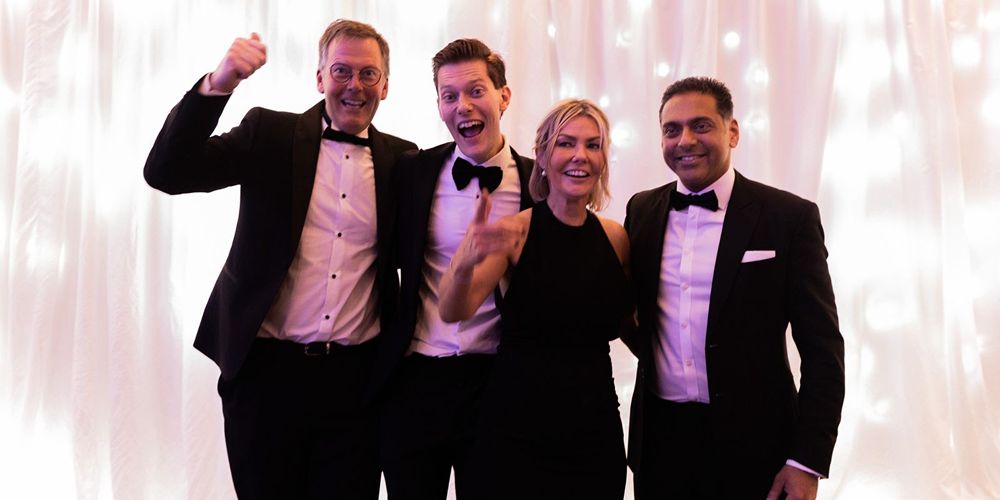
Since her brain cancer diagnosis in January 2023, Mel Crossland has raised awareness and funds for groundbreaking research and a transformative MRI scanner at Leeds.
When Associate Professor and Honorary Consultant Neurosurgeon Ryan Mathew (Medicine 2005; PhD 2018) told Mel Crossland she had an inoperable brain tumour, it was a shock.
Mel is a former managing director at Leisure United and at Sports Direct. All her life, she’s worked in highly pressurised environments, made important decisions and taken control of situations.
“I just didn’t get it,” she said. “I thought, ‘what do you mean you can’t take it out? There has to be something you can do.’”
Mel had been working at her desk when she lost control of her arm. A trip to the hospital for CT scan was followed by an MRI scan, and the meeting with Ryan – who delivered the devastating news.
“I was angry,” Mel said. “Why me? Why had I been picked out of the queue? I exercise regularly, eat healthily, I don’t smoke – I’ve run marathons. I went from a high-pressured job managing over 1,000 staff to being told I was no longer allowed to drive.”
Ryan explained that her cancer was over the area of her brain which controls the opposite side of her body, making it impossible to remove without causing harm. A biopsy, carried out by a small robot, helped establish that the tumour was only growing slowly. Mel underwent radiotherapy and chemotherapy – which shrank the tumour, but not to the size needed for an operation.
“It’s bad luck,” Mel said. “I soon realised I didn’t want to be that angry person. It didn’t achieve anything. So I pushed that emotion into something positive.”

Each year, around 9,000 people in the UK are diagnosed with brain cancer. Brain tumours are the biggest killers in children and under 40s, yet only 1% of cancer funding in the UK is allocated to brain cancer research. Science hasn’t made significant progress, the prognosis remains static, and there is still no explanation as to why people get the disease.
“Those stats motivate me,” Ryan said. “I want to stop having those conversations with patients. I want to move the conversation to say: ‘I’ve got a treatment for you’.”
Ryan is part of a multi-disciplinary team at Leeds working to make it happen. Alongside chemists and biologists, he’s investigating nanoparticles that carry drugs to the tumour via the blood supply. Alongside engineers, he’s developing robotic tentacles which navigate the natural corridors of the brain to deliver drugs, and robots to cut tumours out in a minimally invasive way. Alongside experts in the School of Computer Science, he’s developing artificial intelligence as an early detection tool of speech abnormalities in patients – as speech can be one of the first areas to be affected by a tumour.
“Our interdisciplinary work is groundbreaking,” Ryan said. “But we lack the success stories with this disease to help advocate for research and funding. That’s partly due to survival rates, but also because the very organ you need to tell your story – the brain – is impacted by the illness. If your survival time is 12 months, and you’re undergoing operations and treatment in that time, how are you going to tell your story?”
And that’s when it clicked for Mel. “I realised I’m well enough,” Mel said. “I can raise awareness and commit to fundraising.”
A new consortium called ‘Brain tumour focus’ has brought together major brain cancer charities in the region to pool expertise and resources. Supported by Ryan, one of the consortium’s first projects is to fund a portable MRI scanner – currently unavailable for patients in the UK – which caught Mel’s attention.
The scanner’s ultra-low magnetic field means no need for specialised shielding of patients and equipment, so it can be wheeled to location – including operating theatres to check if enough tumour has been removed from a patient on the day, saving further scans and procedures. The unit can be taken into the community – to GP surgeries, supermarket car parks, and even schools – reducing the number of patients attending hospitals for scans, most of which are negative. It would prove a key detection tool for catching brain tumours early, improving outcomes for patients.
“Normal MRI scanners are daunting,” said Mel. “You’re fixed down to the slab, they’re noisy, and they take a long time. Children often have to go under anaesthetic to cope with them. This new scanner would change that experience – parents could sit in the scanner holding the child’s hand, for example. It would make an instant, tangible difference, and that’s what motivated me.”
Mel’s fundraising efforts cumulated in a black-tie ball in November 2024, attended by over 200 guests – including Ryan. The evening raised over £25,000, pushing Mel closer to her goal of funding the portable scanner. She has now raised over £50,000 through her efforts – and has more events planned in the diary for 2025.
“It was so special to see how many people came along,” said Mel. “My cancer doesn't go away, but you keep going for your friends and family and everyone who was there. You soon realise that they’re what matter.
“I know this could have been a different story for me if I had the opportunity of an early scan, so I’m making the most of the time I have to truly make a difference.”
Further information
Find out more about the new consortium bringing together major brain cancer charities in the region.
For further information, contact Ed Newbould at e.w.newbould@leeds.ac.uk